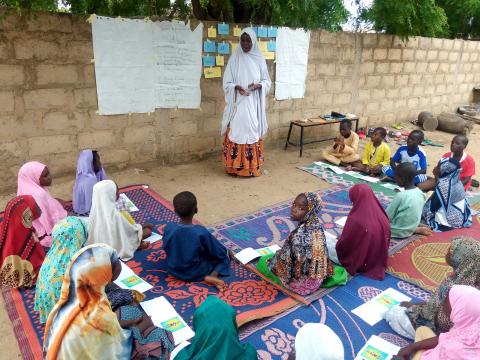Providing an alternative education system to Maradi children during the COVID-19 pandemic

The major challenge for education in Niger is that of the quality of learning, which is particularly critical in the early years when basic reading, writing and mathematical skills are not acquired and remain the weakest in the sub-region. Only 8.5% of pupils at the end of primary school reach the desired threshold in reading and this rate is 7.6% in mathematics for the same level, with negative repercussions for the education sector as a whole.
This situation is exacerbated by delays in the start of the school year, the massive displacement of populations, the shortage of teachers and the lack of teaching materials and tools. World Vision applied for and received funding from Education Cannot Wait (ECW) to implement the project 'Support to Maradi Region for an Alternative Education System in the Context of COVID-19'. This intervention based on the 'Unlock Literacy' approach aims to improve the level of children's reading and writing skills. It is led by monitors identified within the community through reading camps.
Located in the commune of Tibiri in Guidan Roumji department of Maradi region, the village of Inbelbelou is one of the 17 villages benefiting from this project. As in the other villages, the population of Inbelbelou has to respond to the brutal interruption of schooling imposed by the COVID-19 pandemic. A native of the village of Inbelbelou, Mrs Kaltimou Sami is one of the six monitors identified by the population and trained by the World Vision team to lead the activities of the camps.
Initially plunged into doubt, Kaltimou Sami says: "The day I was proposed for this job as a camp instructor, I was very stressed because I didn't feel capable. I was wondering how I could succeed in teaching children in formal school. But as soon as the training of the counsellors began, I started to realise the importance of the camp. Confidence is starting to come to me, but I am still aware that the challenge is still great."
The activities of the reading camps, which were to last four months, immediately aroused great enthusiasm among the population of Inbelbelou. At the end of the second month of activities, the smiling instructor Kaltiumou shares her experience:
"At the moment, I feel very confident. This activity allowed me to know my values and see how they can influence my community. In such a short period of time, our enrolment has risen to 75 students, compared to a forecast of 25. Also, parents visit us regularly. While some do so in a spirit of follow-up and encouragement, others do so out of curiosity, just to see how people like me can be an alternative way of teaching children. Some parents even tell funny stories and tales to the children in order to awaken them more, including the village chief who, despite his 80 years of age, is still very much alive. This can only galvanise us. Even children who are not yet of school age like to go to the camps. I'm used to seeing four- or five-year-olds coming to the camps in large numbers. By dint of coming, many of them have mastered the songs and games made for the camp regulars. So in addition to the educational aspect, the children have found a real place for entertainment".
Thanks to the efforts of Kaltimou and 79 other volunteers who received training in the Unlock Literacy curriculum, child protection and World Vision's safeguarding policy, approximately 4,606 children (children from host communities, IDPs, and refugees) from CI, CP and CE1 levels in 40 reading camps improved their skills on letter knowledge, phonemic awareness, spelling, reading fluency and comprehension. The reading camps have benefited from more than 9,000 books to which are added 2,885 French and mathematics textbooks (exercises and corrections) made available to 1743 CM2 pupils.
The project has helped to protect 12,480 pupils and 306,687 listeners against the COVID-19 disease and other diseases linked to lack of hygiene through the dissemination of awareness messages via three community radios, the production of 1,000 awareness booklets, and the provision of more than 400 hand-washing kits, 1,200 boxes of soap and 70 infrared thermometers. These interventions of World Vision in Niger, made possible thanks to the financial support of ECW, have undoubtedly brought hope and smiles back to these communities living in a very fragile security context.
Nevertheless, despite the strong mobilisation of humanitarian actors and government services, the challenge of schooling remains because, in addition to disruptions linked to the COVID-19 pandemic, the school year in Niger has just experienced another shock linked to the floods caused by the heavy rains recorded in the country. Hence, there is urgent need to multiply efforts for the well-being of children in general and that of the refugee and displaced populations in particular.
Through the activities of the reading camps based on World Vision's Unlock Literacy approach, a community has discovered its ability to make a difference in the lives of children through education.
---
The population of Maradi represents 20.1% of the total population of Niger. The poverty index is 67.2%, while its fertility rate remains the highest (7.2 children/woman), while 34% of girls are married before the age of 15.